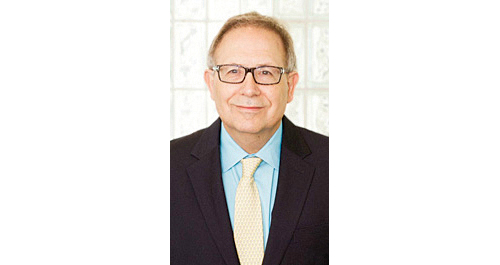Q&A: Dr. Louis Avvento honored after 40 years in the cancer field

About 35 years ago, when Dr. Louis Avvento was completing his residency, he decided to enter the oncology and hematology field, which studies cancer.
“I was fascinated by the disease itself,” said the 62-year-old Southampton resident. “We had very little in the way of drugs back then and I was inspired to join something in its infancy to hopefully see it grow.”
Dr. Avvento opened Eastern Long Island Hematology and Oncology in Riverhead in 1988, when the fight against cancer was increasingly coming into the fore. Nearly 30 years later, ELIHO has a second office in Southampton and recently merged with NSHOA Cancer Center, an outfit with 14 locations spanning from Smithtown to the South Fork.
Dr. Avvento and the other doctors on ELIHO’s staff — Dr. Alexander Zuhoski and Dr. Deepali Sharma — were among those honored on Friday with North Fork Breast Health Coalition’s second annual Pink Pearl Spirit Award. According to its mission statement, the Riverhead nonprofit works “to encourage and assist in the prevention, early intervention and cure of breast cancer through advocacy, awareness, networking and research.”
“The practice itself is really well-regarded by everybody who’s gone through them,” said Mary McEvoy, the coalition’s vice president. “They make people feel at ease.”
Dr. Avvento, who plays in a men’s hockey league when he isn’t at the office or spending time with his four kids and two grandchildren, took a few minutes to speak with us about how the cancer field has changed during his time, along with his decision to merge his practice with NSHOA Cancer Center.
Q: How have you seen the cancer field evolve in the time you’ve been practicing?
A: I think when we first started back in the 1980s, if we cured two out of 10 we were happy. Now, if we’re curing seven or eight out of 10 of some diseases nowadays, that can be a reality. I think a lot of that has to do with all the screening we do now. We find them more and we’re discovering them more.
Q: What has come along in recent years that has helped you help your patients?
A: With the advent of genomic testing on tumors, we have the ability to identify specific genetic markers — and when targeted with the appropriate drug, it can render the tumor cell dead without hurting normal cells.
Q: What will your patients have access to that they didn’t before after merging with NSHOA Cancer Center?
A: They will have access to [NSHOA Cancer Center’s] clinical trials, which we didn’t have access to before, unless it was part of the university program. We’ll have access to certain vaccines and access to analyzing blood with special machines. And we’ll have the ability to collaborate with other community oncology centers, which are under assault.
This makes us more viable financially. It’s difficult to try and treat patients with drugs they need with insurance companies that won’t cover them and pay for them [through us]. When patients do get the drug they need, the insurance companies don’t reimburse us for payment for the drug.
What’s happening now across the country is that groups are bonding together to get better buying power to get these drugs priced where we can afford to stay in business. It gives us a bigger voice.
Q: How does it feel to be honored by the North Fork Breast Health Coalition?
A: It’s wonderful. This is something I’ve been doing for 40 years, and it’s been great to see how much our organization and the oncology community has grown out here.
I love seeing that next generation come along. Because you know the mother had breast cancer, but because we’re screening the children now, it’s nice to see several generations down the line. That’s the most rewarding thing — seeing the next generation.








